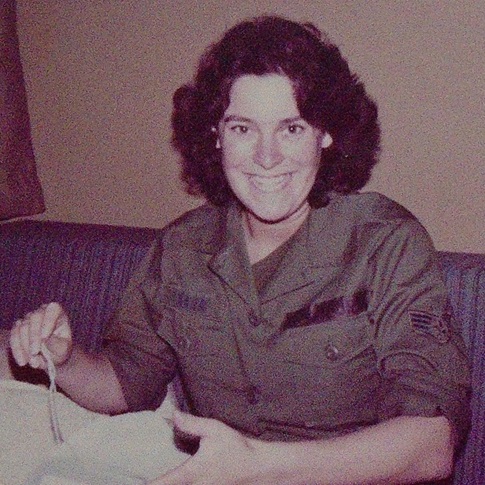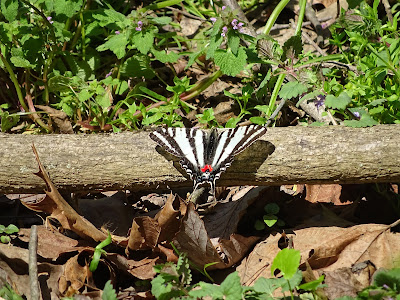An afternoon trip to East Berlin and a random glance out the window would forever change my view of patriotism.
_____________________________________
 |
| Looking across the wall into a bleak and dismal East Berlin |
Tap-tap. Tap-tap-tap.
I leaned against the window of our duty bus and glanced out. It was the spring of 1982 and we had just pulled up to a red light in East Berlin. There was a young couple in the car beside us. Cramped in the back was an old woman. I watched as she steadily tap-tapped her window.
I had arrived at my West Berlin duty station a few months earlier and, like most, was curious to see Communist East Germany. So when our flight chief announced a day trip to East Berlin I signed up. For security reasons we wore dress blues that day, no name tags, and were ordered to stay together in pairs. There was a preassigned itinerary including a list of places we could and could not visit. “Don’t wander off,” our leader had warned. “Don’t converse with the locals. Don’t give your name. Don’t ride the S-Bahn. Don’t drink the soda pop, there’s something funny in it. Laxative, I think. And for God’s sake, stay together.”
 |
| Charlie Flight in our dress blues. I'm front row, far left |
Our first group stop was the Soviet War museum where the Russian doyen proudly walked us through room after room explaining how the resilient Soviet Union single-handedly defeated fascist Germany in the Great Patriotic War, or World War II. Next we were driven to the Karl Marx Plaza, the “showcase to the west,” with its dismal store displays and long queues of East Germans hoping for something – anything – to arrive in bulk. I bought a cheap notebook, its paper flecked with wood pulp. When the clerk handed me my change I thought the coins were fake, they were so lightweight and flimsy.
My friend Rex and I grabbed lunch at one of the few approved cafes, declining the soda. We poked around another shop or two, its wares just as depressing. I was taken aback by a small silver plated dustpan and brush for sale. It looked out of place next to the thick wool stockings and cheap alarm clocks. But for centuries the eastern part of Germany had been home to its aristocracy.
Now, the eastern part was Communist and there was no call for silver-plated anything. So someone’s family heirloom sat on the dusty shelves with scant chance of finding a new home.
After a short walk, Rex and I headed back to the duty bus. East Berlin, unfortunately, lived up to everything I had read.
At the end of World War II, Germany had been divided by the Allies. The western half worked to become a free democracy aided by Great Britain, France, and the United States. But the eastern half had fallen to Communism. The city of Berlin itself, although geographically located in East Germany, was also divided.
West Berlin, a little “island city” behind the Iron Curtain, was still part of West Germany and therefore free. But that had not been the Soviet Union’s intent.
Immediately following the war the Soviets halted all western traffic into the city by road and rail. They tried to choke off supplies to the city’s western half in order to ensure its downfall. What they had not counted on was overhead airspace. Within weeks, planes from the US and UK began flying into West Berlin delivering cargo to keep the bedraggled city running. The year-long airlift brought everything from dry goods to canned goods, wheat, fat, fish, milk, coffee, coal and books. Aircraft came in so steadily that at the height of the airlift a plane landed once every minute. And there was the beloved Candy Bomber who had dropped chocolate bars from the sky, each equipped with a tiny parachute. All told, nearly 400,000 tons of supplies were delivered during the Berlin Blockade. Those who lived through it never forgot.
 |
The American Candy Bomber dropped chocolate bars each equipped with a tiny parachute
|
Twelve years later, with the Allies still firmly entrenched, the Berlin Wall went up -- virtually overnight. East Germans were told it was to keep corrupt western capitalists out, but most understood it was to keep themselves in. Those who were able, quickly grabbed what they could and had fled to West Berlin, to loved ones, to freedom. Unfortunately, many older folks, perhaps like the woman tap-tapping her window, could not move that fast. Once the cement had dried on the wall, there was little to no chance of ever getting out.
By 1982, West Berlin had risen from the rubble to become a thriving cosmopolitan city again. But East Berlin paled in comparison, like a malnourished cousin. Walking through its streets I noticed very few advertisements on its beige buildings. Clothing was outdated and ill-fitting. Music in shops was sparse, very little modern and nothing at all from the west. Propaganda signs, however, were prominent in the east, touting the virtues of soviet reform.
 |
| The graves of those killed trying to escape to West Berlin. "Unbekannt" means unknown. |
Our bus was headed back to West Berlin now, to our barracks, to a vibrant downtown, hopping bistros, and bulging department stores. I continued to watch the old woman as she tapped. I tapped my window and waved. She looked up and, smiling, waved back. Then she pointed to something just below my window and, to my surprise, began crying.
There was a small American flag painted on the side of our bus. She pointed again and saluted. Then I understood.
She must have been a young woman when Allied forces marched in at war’s end. Perhaps she had watched as our planes brought life-saving supplies to Tempelhof Airfield. Maybe she stood in line waiting for her daily rations. And when the wall went up in 1961 maybe she had had small children and couldn’t get to West Berlin fast enough in a last-ditch effort. Maybe she tried but just couldn’t. So she had stayed in the east. Trapped behind the Iron Curtain.
I like to think when she saw our little painted flag she once again felt hope. I like to think she still felt kindness toward an ally who had nothing to gain but goodwill and gratitude.
We could not have been at that red light for much more than a minute, yet I still sense the impact. I was proud to be a very small cog in our post-war mission in Europe. Proud to help stem the tide of Communism that had washed over Eastern Europe; to stand fast surrounded by opposition. But it pained me to see this frail woman saluting our bus, tears streaming down her face, knowing she had so little hope.
It’s been almost 35 years since she and I waved, and I will never know if she lived long enough to see the wall come down in 1989. I’ll never know if she reconnected with family living in West Berlin. Or West Germany. I don’t know if she thought of escape or was ever able to leave the city. But I have never forgotten her tap-tap-tap. And I’ve never forgotten why I served our country.
 |
1982 in my fatigues right before going on a
swing shift in West Berlin
|
This story was first published on the National VFW website in honor of Women in the Military, March 2017.
________________________________________________________
On a Side Note . . .
 |
| Rex and I were married September 1982 at Rathaus Steglitz in West Berlin |

































